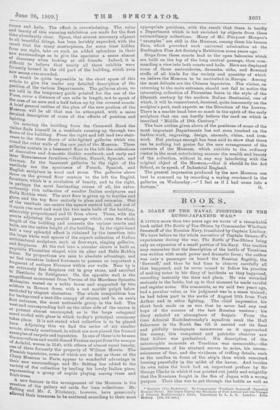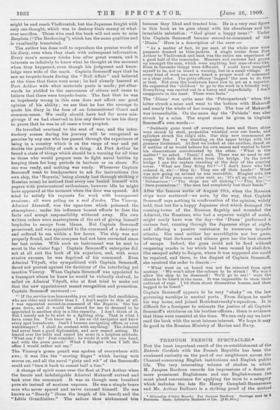BOOKS.
A DIARY OF THE NAVAL FIGHTING IN THE RUSSO-JAPANESE WAR.*
A LITTLE more than two years ago we wrote of a remarkable book called The Battle of Tsu-Shima, by Commander Wladi m ir Semenoff of the Russian Navy, translated by Captain Lindsay. We have before us the whole narrative of Captain Semenoff's experiences during the war, The Battle of Tsu-Shima being only an expansion of a small portion of his diary. Our readers may remember that the description of the battle of Tsushima was written with much power and dramatic force ; the author was only a passenger on board the Russian flagship, the Suvoroff,' and thus he had time to observe carefully all that happened, and he never ceased to follow his practice of making notes in his diary of incidents as they happened, recording instantly the time and place. He was wounded seriously in the battle, but up to that moment he made careful and regular notes. His comments, as we said two years ago, had a peculiar value, as his judgment was in a sense trained; he had taken part in the sortie of August 10th from Port Arthur and in other fighting. The chief impression his short book made on us was that he never had any real hope of the success of the last Russian venture ; his diary exhaled an atmosphere of despair. From the time Admiral Rozhdestvensky's squadron sunk the Hull fishermen in the North Sea till it carried out its final and pitifully inadequate manoeuvres as it approached the enemy, this competent and patriotic observer saw that failure was predestined. His description of the catastrophic moments at Tsushima was memorable,—the insensitiveness of his strained nerves to noise, his uncon-
sciousness of fear, and the vividness of trifling details, such as the candles in front of the ship's ikon which remained burning peacefully in the midst of the havoc. And besides its own value the book had an important preface by Sir George Clarke in which it was pointed out justly and weightily
that the Russians fought in time Sea of Japan with a wrong purpose. Their idea was to get through the battle as well as • Resplata (The Reckoning). By Commander \Vladimir Somenoff (Imperial Russian Navy). His Diary during the Blockade of Port Arthur and the Voyage of Admiral Rojentvensky'ra Fleet. Translated by L. A. B. London ; John Murray. [10s. Oa. not.] might be and reach Vladivostok, but the Japanese fought with only one thought, which was to destroy their enemy at what- ever sacrifice. Those who road the book will not care to miss Rasplata ("The Reckoning"), which has the same qualities and is excellently translated.
The author has done well to reproduce the precise words of his diary, oven when they clash with subsequent information.
.Every man's memory tricks him after great events, and it interests us infinitely to know what he thought at the moment when they happened, even though his judgment and know- ledge were wido of the mark. Captain Semenoff says that he saw no torpedo-boats during the "Hull Affair" and believed at the time that there wore none ; he had already learned at Port Arthur with what materials panic is made; yet after- wards he yielded to the assurances of others and came to believe that there were torpedo-boats. The fact that he was so hopelessly wrong in this case does not affect our good opinion of . his ability ; we see that he bee the courage to quote his. diary in the face of an International Court and common-sense. We really should have had far more mis- givings if we bad observed in him any desire to use his diary to prove that he was in all cases a true prophet.
He travelled overland to the seat of war, and the intro- ductory scenes during his journey will be recognised as genuine by any one who has passed through the experience of being in a country which is on the verge of war and yet doubts the possibility of such a thing. At Port Arthur he found a state of things which should be a warning for all time to those who would prepare men to fight naval battles by keeping them for long periods in harbour or on shore. No one was ready, and nothing was ready. Whenever Captain Semenoff went to headquarters to ask for instructions (his own ship, the 'Boyarin,' being already lost through striking a Russian mine) he noticed that every one busied himself with papers with preternatural enthusiasm, however idle he might have appeared at the moment when the door was opened. All
tried to satisfy his requests for, work with transparent evasions ; all were acting on a mot d'ordre. The Viceroy, Admiral Alexeieff, was the upae-tree which poisoned the atmosphere ; under his influence honest efforts to face the facts and accept responsibility withered away. His own written orders were masterpieces of the art of giving himself loopholes to escape from blame. But Captain Semenoff persevered, and was appointed to the command of a destroyer and ordered to sea. within a few hours. The ship was not properly found, and the compass had not been corrected since her last cruise. With such an instrument was he sent to scout in the winter fogs! Captain Semenoff's enterprise did not at all suit the book of his superiors, and, with some evasive excuses, he was deprived of his command. Even
Admiral Vityeft, who sympathised with Captain Semenoff, dared not protest against the decisions of the interfering yet inactive Viceroy. When Captain Semenoff was appointed to
a transport where he knew he would be virtually shelved, he called on Admiral Vityoft, who at first tried to make out
that the new appointment meant recognition and promotion. Captain Semenoff answered :-
" If the service is so honourable, you will easily find candidates, who are older and worthier than I. I don't aspire to this at all. I was appointed second-in-command of the Boyar in. She has gone down, and it would be absurd for me to demand to be appointed to another ship in a like capacity. I don't think of it. But I merely ask to be sent to a fighting ship. That is what I have come for. You know me. I am an old navigator and know every spot hereabouts. Can't I become navigating officer, or oven Watchkeoper ? I shall .be content with anything.' The Admiral had never been a good diplomatist, and now ceased noting. He loaned over the table and raised his arms in a helpless attitude. 'What can I do ? Just consider : he wrote it with his own hand, and with the green pencil.' What I thought when I left the office I would rather not say."
The Viceroy's green pencil was spoken of everywhere with awe; it was like the "moving finger" which having writ
moves on, and all the naval "piety and wit" of the Semenoffs could not "lure it back to cancel half a line."
A change of spirit came over the fleet at Port Arthur when the heroic and indefatigable Admiral Makaroff arrived and took over the command. It was as though men breathed pure air instead of noxious vapours. He was a simple brave man who never spared' and never excused himself. He was known as "Beardy " (from the length of his beard) and the "Little Grandfather." The sailors thus nicknamed him because they liked and trusted him. He is a very real figure
in this book as he goes about with his cheeriness and hie invariable salutation: " God grant a happy issue!" -Under
him Captain Semenoff became second-in-command of the Diana.' Here is a description of the crew:—
" As a matter of fact, 50 per cent. of the whole crew were peasants dressed as blue-jackets. A single cruise from Port Arthur to Vladivostok and back was the entire sea experience of a good half of the remainder. Manners and customs had grown up amongst the men, which wore anything but man-of-war-like. Even in barracks things were different. I could have imagined myself to be, not on board a warship, but in a small village. At every kind of work one never heard a proper word of command or a clear order. The petty officers bogged' the mon to do this or that. Not even the boatswain knew how to act as a superior. Ho requested the children' to go to the work in a friendly waY. Everything was carried out in a hurry and superficially. I don t exaggerate in the least. These were facts."
The ' Diana' was quite near the 'Petropavlovsk' when the latter struck a mine and went to the bottom with Makaroff
and nearly the whole of her company. The loss of Makaroff was irremediable. On the same day the 'Pobieda' was also struck by a mine. The sequel must be given in Captain Semenoff's own words:—
" Suddenly guns went off everywhere, hero and there ships wore struck by shell, projectiles whistled over our heads, and splinters struck the ship's Bile. Our ship now commenced an irregular fire. I was standing on the upper bridge with the gunnery lieutenant. At first we looked at one another, dazed, as if neither of us would believe his own senses and wanted to have his observations corroborated by the other. What is the matter?' he asked. Panic,' I said. There was no need to say more. We both dashed down from the bridge. On the lower bridge I saw the captain standing at the door of the conning tower. ' What are they firing for ? '—' I don't know who has ordered it, ale .= Stop it I They are off their heads I ' What was now going on around us was incredible. Mingled with the thunder of the guns came cries such as : ' It's all up with us !'— ' Submarines !'—"rhe ships are all sinking !'—' Fire, fire !'— ' Save yourselves!' The mon had completely lost their heads."
After the famous sortie of August 10th, when the Russian ships were scattered—we note, by the way, that Captain Semenoff says nothing in confirmation of the opinion, widely held, that but for a happy Japanese shot which damaged the conning-tower of the Russian flagship and wounded the Admiral, the Russians, who had a superior weight of metal, might easily have won the day—the 'Diana' performed a curious feat, running through the Japanese ships at night, and offering a passive resistance to numerous torpedo attacks. She used neither her searchlights nor her guns, believing that darkness and silence gave her the best chance of escape. Indeed, the guns could not be fired without reopening cracks in her which had been caused by shell-fire. She escaped safely to Saigon, where it was supposed she could be repaired, and there, to the disgust of Captain Semenoff, she received the order to disarm :- " What went on on board was not far removed from open mutiny. We won't allow the colours to be struck ! We won't allow the ship to be disarmed ! We'll go to sea!' wore the shouts to be hoard in the mesa. It was impossible to stem their outbreak of rage. I lot thorn shout themselves hoarse, and then begged to be heard."
Captain Semenoff appears to be very "shaky" on the law governing warships in neutral ports.. From Saigon lie made his way home, and joined Rozhdestvensky'e squadron. It is difficult for a foreigner to estimate the justice of all Captain Semenoff's strictures on his brother-officers; there is evidence that these were resented at the time. We can only say we have read the book with the most intense interest. We hope it may do good in the Russian Ministry of Marine and Navy.



























































 Previous page
Previous page